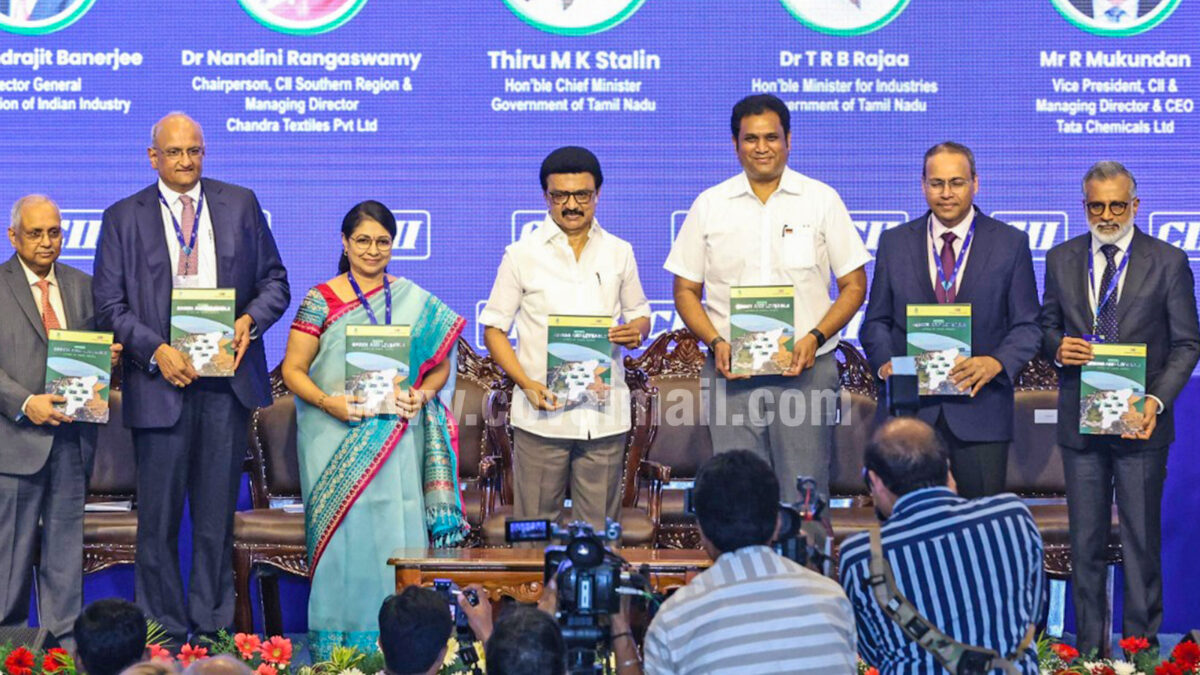“Tamil Nadu has maintained an impressive economic growth rate of over 8% in the past three years, reinforcing its role as India’s second-largest economy. The state contributes 12.11% to the country’s overall production, solidifying its position as an industrial powerhouse.
Tamil Nadu continues to lead in electronics exports, accounting for 37.1% share of the country’s total exports. An investment of INR 500 crore is set to establish a semiconductor manufacturing park across 100 acres in Sulur and Palladam, is also being proposed,” said M K Stalin, Chief Minister of Tamil Nadu, at the CII South India Annual Convention 2025 with the theme, Infra South: Crafting Liveable Environment in Indian Cities.
“With a vision to become a $1 trillion economy by 2030, Tamil Nadu’s strategic approach to growth prioritizes not just economic expansion but also inclusivity, with a strong emphasis on women’s empowerment and equality. Beyond its metropolitan hubs, Tamil Nadu is home to some of India’s most significant industrial cities, including Coimbatore, Trichy, Hosur, Madurai, Salem and Thoothukudi, all of which are emerging as economic strongholds.
The State’s unique growth model, driven by industrial excellence and a commitment to sustainable development, continues to set benchmarks for nationwide progress,” the CM added.
The Chief Minister released the report on Green and Liveable cities in Tamil Nadu, outlining a roadmap to enhance urban sustainability, attract investment and improve the overall quality of life in the presence of T R B Rajaa, Minister for Industries, Government of Tamil Nadu; Mukundan, Vice President, Confederation of Indian Industry and Managing Director & CEO of Tata Chemicals Limited; Dinesh, Immediate Past President, CII, & Chairman, TVS Supply Chain Solutions Limited and Thomas John Muthoot, Deputy Chairman, CII Southern Region & Managing Director, Muthoot Fincorp Limited.
The CM also launched Phase 2 of Project Puthiya Payanam, Valarchiyai Noki of CII-Centre of Excellence for Employability and Livelihoods (CII-CEL) which aims to empower 1,000 micro-entrepreneurs across Tamil Nadu within a year.
This initiative, backed by the private sector, particularly the TVS Group, focuses on employment generation and strengthening small businesses, contributing to Tamil Nadu’s broader goal of creating 5,000 entrepreneurs.
Chandrajit Banerjee, Director General, CII, highlighted the critical role of Tamil Nadu in advancing sustainable development through industry-driven initiatives, stating, “There are two CII Centres of Excellence—CII Institute of Logistics and the CII Institute for Employment and Livelihood in Tamil Nadu.
These CoEs play a significant role in strengthening supply chain capabilities and fostering competitiveness among micro and small enterprises, aligning with Tamil Nadu’s vision of sustainable urban development and employment generation.
“Sustainable urban development remains a cornerstone of Tamil Nadu’s long-term growth strategy, ensuring that cities remain inclusive, climate-resilient and future- ready. We reaffirm CII’s commitment to working closely with the State government in achieving these objectives,” said Chandrajit Banerjee.
R Nandini, Chairperson, CII Southern Region and Managing Director, Chandra Textiles Pvt Ltd, in her welcome address emphasized Tamil Nadu’s leadership in education and its significant budgetary allocation of ₹55,000 crores for the sector in 2025-26 which far exceeds the national per capita average by nearly 8 times, reflecting the State’s dedication to skill development, gender parity, and employability.
“Tamil Nadu’s progressive education initiatives, including Nan Mudhalvan, Pudhumai Penn and more schemes, serve as benchmarks for other States, reinforcing its role as a model for inclusive growth,” she pointed out.
“With Tamil Nadu ranking first nationally in CII membership, this affirms its position as a critical driver of India’s industrial landscape, with Chennai serving as a strategic hub for economic and policy advancements,” she added.
The CII South India Annual Convention 2025 had panel discussions on Southern India’s Economic Outlook: Pathway to Sustainable Growth, Urban Transformation & Economy: Creating Future-Ready Cities, Urban Future in South India – Navigating Policy Intervention, Sustainable Infrastructure redefined – Building liveable Cities and Re-imagining Social Infrastructure – Challenges & Pathways.




